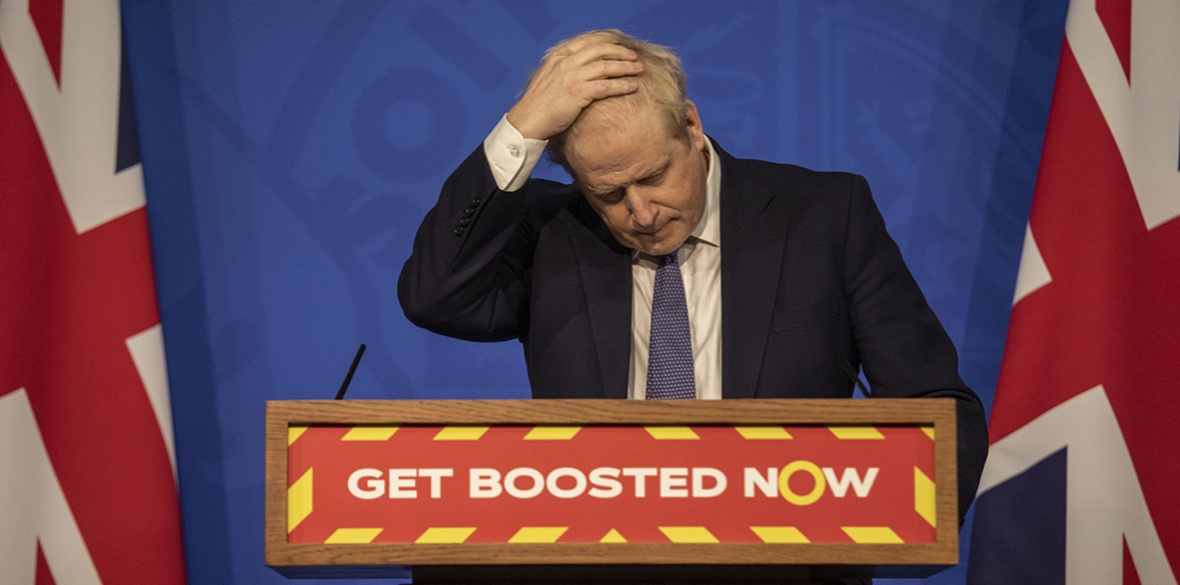WITH staff absences in the NHS trebling in a month — 35,596 daily absences were recorded on average in the week up to January 2 — ministers continue to evade responsibility for a worsening emergency.
Boris Johnson argues that we must “ride out the wave” of omicron while Sajid Javid points out, accurately, that the majority of critically ill Covid patients are unvaccinated and getting jabbed will protect you, those around you and the health service itself.
At the same time relatively lower hospitalisation and death rates — linked to the high proportion of British adults who are fully vaccinated, and according to some research a less lethal strain of the virus — are used to argue for reduced isolation periods after testing positive, while the message from the big guns of ideological Toryism like the Telegraph is that the country needs to stop snivelling and get back to work — “we’ve forgotten what coping with a normal everyday illness is like,” its columnist Allison Pearson complained this week.
The problem with this “weather the storm” approach — aside from its advocates being rather far from the front line of health professionals battling the virus — is that it treats the pandemic as a transient crisis after which we can go back to “normal.”
Yet the crisis facing the health service has deeper roots than that. As GMB national officer Rachel Harrison puts it, this is not so much a crisis caused by Covid as “a crisis caused by cuts and exposed by Covid.”
The health service was in crisis before Covid. Inadequate resources to deal with the annual winter spike in infections without knock-on effects on other care led to the “NHS winter crisis” becoming a yearly feature of the news cycles under David Cameron, and by 2017 experts were warning of a “permanent winter” in which the warmer months were insufficient to catch up with postponed care, meaning waiting lists for treatment would forever lengthen.
NHS Confederation chief executive Matthew Taylor has acknowledged “the impact of the austerity decade” as a causative factor.
Covid has been likened to an X-ray exposing the internal disorders afflicting our society. The first lockdown, with its commendation of the “key workers” keeping things running, drew attention to the miserable pay rates for some of the most essential work.
Soon disproportionate infections and deaths among black people were highlighting structural racism expressed through different access to housing and jobs, while rising unemployment and the disproportionate burden of domestic care responsibilities and home schooling shone a spotlight on the oppression of women.
The same logic applies to the NHS. The health select committee of MPs is right to warn that treatment backlogs are reaching staggering proportions and there is no sign of a plan to address them.
When the existence of a crisis pre-Covid is acknowledged at all on the right, it is attributed to trends like “an ageing society” — without recognition that an ageing society is one that needs to devote more resources to health and care.
The failure to do so is a result of political choices — the government has no problem finding resources when it comes to commissioning new nukes.
The left needs to be clear that Covid is where today’s politics happens. Vague “contracts with the British people” based on vaguer principles and applied to a hypothetical post-Covid landscape are completely irrelevant to the problems facing ordinary people.
An alternative to the unfolding catastrophe that is British government policy needs to be rooted in how we respond to the virus, not as a temporary aberration but for the long term.
That means strengthening our public services. It means raising pay seriously to make up for a decade of decline to retain and recruit the health workers we need now and in the future.
It means ending the prioritisation of profit over need — which is to challenge the capitalist system itself.









